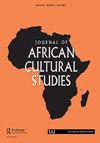“我以为她很普通,我只看到了她的身体”:尼日利亚流行文化中的性和名人宣传
IF 0.9
2区 社会学
Q2 CULTURAL STUDIES
引用次数: 6
摘要
21世纪开启了非洲流行文化的新纪元。嘻哈是一种流行的音乐表现形式,广泛地借鉴了西方和非洲的习语以及权力和社会关系的形象,这是一个决定性的转变。21世纪非洲嘻哈的主题和叙事反映了类似的全球形式,它们对粉丝、明星、女性身体的商品化和性化、暴力和多余的财富展示的概念和赞美。在这篇文章中,我分析了一些罕见的例子,在这些例子中,尼日利亚男性嘻哈艺术家利用他们的才华和诗意的执照,引起公众对妇女在经济和社会政治上被剥夺权利的关注。本文超越对歌曲内容的分析,强调自1999年奈及利亚重新引入文官统治以来,奈及利亚民主进程的核心转变,如何塑造了嘻哈艺术家重新思考女性身体的性化和商品化的环境。本文章由计算机程序翻译,如有差异,请以英文原文为准。
“I Thought She Was Ordinary, I Only Saw Her Body”: Sex and Celebrity Advocacy in Nigerian Popular Culture
ABSTRACT The twenty-first century ushered in a new era in African popular culture. Hip hop, a popular genre of musical expression, which borrowed extensively from Western and African idioms and iconography of power and social relations, took a decisive turn. The themes and narratives of twenty-first century African hip hop mirror similar global forms in their conception and glorification of fandom, stardom, commodification and sexualization of women’s bodies, violence, and superfluous display of wealth. In this article, I examine some of the rare instances in which Nigerian male hip hop artists have used their talent and poetic license to call attention of the public to the economic and socio-political disenfranchisement of women. This article goes beyond a content analysis of the songs to underscore how core transformations in Nigeria’s democratic process since 1999, when civil rule was reintroduced, have shaped the circumstances under which hip hop artists rethink their sexualization and commodification of women’s bodies.
求助全文
通过发布文献求助,成功后即可免费获取论文全文。
去求助
来源期刊

Journal of African Cultural Studies
Multiple-
CiteScore
1.70
自引率
10.00%
发文量
13
期刊介绍:
The Journal of African Cultural Studies publishes leading scholarship on African culture from inside and outside Africa, with a special commitment to Africa-based authors and to African languages. Our editorial policy encourages an interdisciplinary approach, involving humanities, including environmental humanities. The journal focuses on dimensions of African culture, performance arts, visual arts, music, cinema, the role of the media, the relationship between culture and power, as well as issues within such fields as popular culture in Africa, sociolinguistic topics of cultural interest, and culture and gender. We welcome in particular articles that show evidence of understanding life on the ground, and that demonstrate local knowledge and linguistic competence. We do not publish articles that offer mostly textual analyses of cultural products like novels and films, nor articles that are mostly historical or those based primarily on secondary (such as digital and library) sources. The journal has evolved from the journal African Languages and Cultures, founded in 1988 in the Department of the Languages and Cultures of Africa at the School of Oriental and African Studies, London. From 2019, it is published in association with the International African Institute, London. Journal of African Cultural Studies publishes original research articles. The journal also publishes an occasional Contemporary Conversations section, in which authors respond to current issues. The section has included reviews, interviews and invited response or position papers. We welcome proposals for future Contemporary Conversations themes.
 求助内容:
求助内容: 应助结果提醒方式:
应助结果提醒方式:


